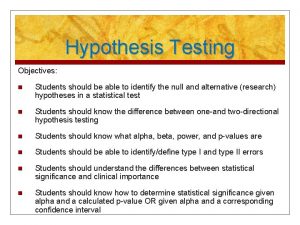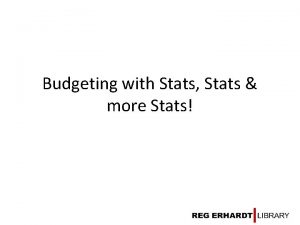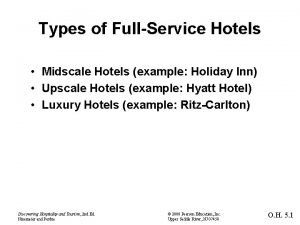Stats with Confidence Arup Nanda Starwood Hotels Lowdown



















































- Slides: 51

Stats with Confidence Arup Nanda Starwood Hotels

Lowdown on Stats • Optimizer Statistics on tables and indexes are vital for the optimizer to compute optimal execution plans • In many cases you gather stats with estimate • Without accurate stats, the optimizer may decide on a sub-optimal execution plan • When stats change, the optimizer may change the plan • Truth: stats affect the plan, but not necessarily positively STARWOOD 2

Meet John the DBA • John the DBA at Acme Bank • Hard working, knowledgeable, politically not very savvy • Collects statistics every day via an automated job STARWOOD 3

Data: Value vs Pattern State Customers %age CT 1, 000 10% NY 5, 000 50% CA 4, 000 40% Important The data itself changed; but the pattern did not. The new stats will not change the execution path, and therefore probably not needed STARWOOD After some days State Customers %age CT 2, 000 10% NY 10, 000 50% CA 8, 000 40% 4

Case 2 State Customers %age CT 1, 000 10% NY 5, 000 50% CA 4, 000 40% Important The pattern is different; but still close to the original pattern. Most queries should perform well with the original execution plan. STARWOOD After some days State Customers %age CT 2, 500 12. 5% NY 10, 500 52. 5% CA 7, 000 35. 0% 5

Naked Truth • Stats can actually create performance issues • Example – – – A query plan had nested loop as a path Data changed in the underlying tables But the pattern did not change much So, NL was still the best path Stats were collected Optimizer detected the subtle change in data pattern and changed to hash joins – Disaster! STARWOOD 6

The problem with new stats • The CBO does not now what is close enough – For it, 50. 0% and 52. 5% are different values • The internal logic of the CBO may determine a different plan due to this subtle change • This new plan may be better, or worse – This is why many experts recommend not collecting stats when database performance is acceptable STARWOOD 7

John followed the advice • • John followed the advice He stopped collecting stats The database performance was acceptable But one day – disaster struck! STARWOOD 8

Data Pattern Changed State Customers %age CT 1, 000 10% NY 5, 000 50% CA 4, 000 40% CT was 12. 5% but now it is 52. 5% STARWOOD After some days State Customers %age CT 10, 500 52. 5% NY 2, 500 12. 5% CA 7, 000 35. 0% 9

• Optimal Plan is Different – Queries against CT used to have index scan; but now a full table scan would be more appropriate • Since the stats were not collected, CBO did not know about the change – Queries against CT still used index scan – And NY still used full table scan • Disaster! • John was blamed STARWOOD 10

What’s the Solution? • If only you could predict the effect of new stats before the CBO uses them – and make CBO use them if there are no untoward issues • Other Option – You can collect stats in a different database – Test in that database – If everything looks ok, you can export the stats from there and import into production database • The other option is not a very good one – The test database may not have the same distribution – It may not have the same workload – Worst – you don’t have time to test all queries STARWOOD 11

Pending Stats • In Oracle 11 g R 1, John can use a new feature – Pending Statistics • In short – John collects stats as usual – But the CBO does not see these new stats – John examines the effects of the stats on queries of a session where these new stats are active – If all look well, he can “publish” these stats – Otherwise, he discards them STARWOOD 12

How to Make Stats “Pending” • It’s the property of the table (or index) • Set it by a packaged procedure DBMS_STATS. SET_TABLE_PREFS • Example: begin dbms_stats. set_table_prefs ( ownname => 'ARUP', tabname => 'SALES', pname => 'PUBLISH', pvalue => 'FALSE' ); end; • After this, the stats collected will be pending STARWOOD cr_sales. sql sales_stats. sql count. sql explct. sql explny. sql upd. sql prefs_false. sql 13

Table Preferences • The procedure is not new. Used before to set the default properties for stats collection on a table. – e. g. to set the default degree of stats collection on the table to 4: dbms_stats. set_table_prefs ( ownname => 'ARUP', tabname => 'SALES', pname => 'DEGREE', pvalue => 4 ); STARWOOD 14

Stats after “Pending” • When the table property of stats “PUBLISH” is set to “”FALSE” • The stats are not visible to the Optimizer • The stats will not be updated on USER_TABLES view either: select to_char(last_analyzed, 'mm/dd/yy hh 24: mi: ss') from user_tables where table_name = 'SALES'; TO_CHAR(LAST_ANAL --------09/10/07 22: 04: 37 la. sql_ STARWOOD 15

Visibility of Pending Stats • The stats will be visible on a new view USER_TAB_PENDING_STATS select to_char(last_analyzed, 'mm/dd/yy hh 24: mi: ss') from user_tab_pending_stats where table_name = 'SALES'; TO_CHAR(LAST_ANAL --------09/21/07 11: 03: 35 pending. sql_ STARWOOD 16

Checking the Effect of Pending Stats • Set a special parameter in the session alter session set optimizer_use_pending_statistics = true; • After this setting, the CBO will consider the new stats in that session only • You can even create and index and collect the pending stats on the presence of the index • To check if the index would make any sense alter_true. sql_ STARWOOD 17

Publishing Stats • Once satisfied, you can make the stats visible to optimizer begin dbms_stats. publish_pending_stats ('ARUP', 'SALES'); end; • Now the USER_TABLES will show the correct stats • Optimizer will use the newly collected stats • Pending Stats will be deleted publish. sql_ STARWOOD 18

What if the New Stats make it Worse? • Simply delete them begin dbms_stats. delete_pending_stats ('ARUP', ‘SALES'); end; • The pending stats will be deleted • You will not be able to publish them STARWOOD 19

Checking for Preferences • You can check for the preference for publishing stats on the table SALES: select dbms_stats. get_prefs ('PUBLISH', 'ARUP', 'SALES') from dual; DBMS_STATS. GET_PREFS('PUBLISH', 'ARUP', 'SALES') -----------------------FALSE • Or, here is another way, with the change time: select pname, valchar, valnum, chgtime from optstat_user_prefs$ where obj# = (select object_id from dba_objects where object_name = 'SALES’ and owner = 'ARUP') PNAME VALCHAR CHGTIME ---------------------PUBLISH TRUE 02 -MAR-10 01. 38. 56. 362783 PM -05: 00 STARWOOD 20

Other Preferences • The table property is now set to FALSE • You can set the default stats gathering of a whole schema to pending begin dbms_stats. set_schema_prefs ( ownname => 'ARUP', pname => 'PUBLISH', pvalue => 'FALSE'); end; • You can set it for the whole database as well – dbms_stats. set_database_prefs STARWOOD 21

Loading of Partitioned Tables 1. Load Partition P 1 of Table 2. Rebuild Partition P 1 of the Local Index 3. Repeat for all local indexes 4. Collect stats 1. Load Partition P 2 of Table 2. Rebuild Partition P 2 of the Local Index 3. Repeat for all local indexes 4. Collect stats Collect Table Global Stats 1. You may want to make sure that the final table global stats are collected after all partition stats are gathered 2. And all are visible to CBO at the same time STARWOOD 22

Options • You can postpone the stats collection of the partitions to the very end • But that means you will lose the processing window that was available after the partition was loaded • Better option: set the table’s stats PUBLISH preference to FALSE • Once the partition is loaded, collect the stat; but defer the publication to the very end STARWOOD 23

Defer Partition Table Stats visible here Original P 1 P 2 P 3 Time Index Building Stats Collection P 1 Changed Table Loading Stats visible here P 2 P 3 Time STARWOOD 24

Stats History • When new stats are collected, they are maintained in a history as well • In the table SYS. WRI$_OPTSTAT_TAB_HISTORY • Exposed through *_TAB_STATS_HISTORY select to_char(stats_update_time, 'mm/dd/yy hh 24: mi: ss') from user_tab_stats_history where table_name = 'SALES‘; TO_CHAR(STATS_UPD --------03/01/10 21: 32: 57 03/01/10 21: 40: 38 hist. sql_ STARWOOD 25

Reinstate the Stats • Suppose things go wrong • You wish the older stats were present rather than the newly collected ones • You want to restore the old stats begin dbms_stats. restore_table_stats ( ownname => 'ARUP', tabname => 'SALES', as_of_timestamp => '14 -SEP-07 11: 59: 00 AM' ); end; • reinstate. sql_ STARWOOD 26

Exporting the Pending Stats • First create a table to hold the stats begin dbms_stats. create_stat_table ( ownname => 'ARUP', stattab => 'STAT_TABLE' ); end; • This will create a table called STAT_TABLE • This table will hold the pending stats cr_stattab. sql_ STARWOOD 27

Export the stats • Now export the pending stats to the newly created stats table begin dbms_stats. export_pending_stats ( tabname => 'SALES', stattab => 'STAT_TABLE' ); end; • Now you can export the table and plug in these stats in a test database – dbms_stats. import_pending_stats STARWOOD export. sql del_stats. sql import. sql_ 28

Real Application Testing • You can use Database Replay and SQL Performance Analyzer to recreate the production workload • But under the pending stats, to see the impact • In SPA use alter session set optimizer_use_pending_statistics = true; • That way you can predict the impact of the new stats with your specific workload STARWOOD 29

Some additional uses • You can create a SQL Profile in your session – With private stats • Then this profile can be applied to the other queries • You can create SQL Plan Management Baselines based on these private stats • Later you can apply these baselines to other sessions STARWOOD 30

SQL Plan Management optimizer_goal = all_rows db_file_multiblock_read_count Plan 1 PLAN_HASH_VALUE = 1 a 2 b 3 c SQL Statement SQL_ID = a 1 b 2 c 3 d 4 SELECT ACCESS TABLE INDEX SELECT * FROM EMP WHERE SAL>1000 optimizer_goal = first_rows db_file_multiblock_read_count A single SQL statement may have multiple plans associated with it STARWOOD Plan 2 PLAN_HASH_VALUE = 2 a 3 b 4 c SELECT ACCESS TABLE INDEX 31

Plan P 1 SQL Statement S 1 Plan P 2 Plan P 3 Baseline STARWOOD A baseline is a collection of plans for a specific SQL statement 32

Plan P 1 SQL Statement S 1 Plan P 2 Plan P 3 Plan P 4 Baseline STARWOOD A new plan was generated as a result of some change, e. g. the optimizer parameters were changed. This plan is added to the baseline 33

Plan P 1 SQL Statement S 1 Plan P 2 Plan P 3 Plan P 4 When a SQL is reparsed, the optimizer compares the plan to the list of plans in the baseline, but not the newly generated plan as it is not “accepted”. Baseline STARWOOD 34

Plan P 1 SQL Statement S 1 Plan P 2 Plan P 3 A plan is no longer valid, e. g. it had an index scan; but the index was later dropped. It is marked as such. Plan P 3 Baseline STARWOOD 35

New Plan is Worse • Baselines contain the history of plans for an SQL statement • If there was a good plan ever, it will be there in the baseline • So the optimizer can choose the plan with the lowest cost Cost = 10 Plan P 1 Cost = 12 Plan P 2 Cost = 9 Plan P 3 New plan. Cost = 15 Plan P 4 Optimizer will choose P 3 even though the new plan generated was P 4 STARWOOD Baseline 36

New Plan is the Best • Even if the new plan is the best, it will be not be immediately used • The DBA can later made the plan fit for consideration by “evolving” it! Cost = 10 Plan P 1 Cost = 12 Plan P 2 Cost = 9 Plan P 3 New plan. Cost = 6 Plan P 4 Optimizer will choose P 3 since it is the best in the list of “accepted” plans STARWOOD Baseline 37

SQL Statement New Plan Generated yes any other accepted plans in baseline? no Choose the best accepted plan Add this plan to the SMB Use this best plan, not the new plan Baseline this plan but set to Not Accepted STARWOOD 38

SQL Management Base • A repository where the following are stored – – Statements Plan histories Baselines SQL profiles • Stored in SYSAUX tablespace STARWOOD 39

Configuring SMB To Check select parameter_name, parameter_value from dba_sql_management_config; PARAMETER_NAME PAMETER_VALUE ------------SPACE_BUDGET_PERCENT 10 PLAN_RETENTION_WEEKS 53 To Change: BEGIN DBMS_SPM. CONFIGURE( 'PLAN_RETENTION_WEEKS', 100); END; STARWOOD 40

Adding Baselined Plans • To capture baselines alter session set optimizer_capture_sql_plan_baselines = true / • … execute the queries at least 2 times each • Or run the application as usual alter session set optimizer_capture_sql_plan_baselines = false / • A plan is baselined when a SQL is executed more than once STARWOOD Cap_true. sql Cap_false. sql_ 41

Plans With Pending Stats • Change the optimizer parameter to use pending stats alter session set optimizer_use_pending_statistics = true; • a new plan is generated • Capture the plans for the baseline alter session set optimizer_capture_sql_plan_baselines = true; • Now all the plans will use pending stats in the session • The new plan is stored in baseline but not “accepted”; so it will not be used by the optimizer STARWOOD 42

To check for Plans in the baseline select SQL_HANDLE, PLAN_NAME from dba_sql_plan_baselines where upper(SQL_TEXT) like '%AVG(SALES_AMT)%' / SQL_HANDLE PLAN_NAME ---------------SYS_SQL_4602 aed 1563 f 4540 SYS_SQL_PLAN_563 f 454011 df 68 d 0 SYS_SQL_4602 aed 1563 f 4540 SYS_SQL_PLAN_563 f 454054 bc 8843 SQL Handle is the same since it’s the same SQL; but there are two plans bl 1. sql_ STARWOOD 43

To See Plan Steps in Baseline • Package DBMS_XPLAN has a new function called display_sql_plan_baseline: select * from table ( dbms_xplan. display_sql_plan_baseline ( sql_handle=>'SYS_SQL_4602 aed 1563 f 4540', format=>'basic note') ) Handle 1. sql_ STARWOOD 44

Checking Plans Being Used Execution Plan -----------------------------Plan hash value: 2329019749 -----------------------------------------------| Id | Operation | Name | Rows | Bytes | Cost (%CPU)| Time | -----------------------------------------------| 0 | SELECT STATEMENT | | 17139 | 1690 K| 588 (1)| 00: 08 | |* 1 | TABLE ACCESS BY INDEX ROWID| ACCOUNTS | 17139 | 1690 K| 588 (1)| 00: 08 | |* 2 | INDEX RANGE SCAN | IN_ACCOUNTS_01 | 34278 | | 82 (0)| 00: 01 | -----------------------------------------------Predicate Information (identified by operation id): -------------------------1 - filter("TEMPORARY"='Y') 2 - access("STATUS"='INVALID') This shows that a SQL Plan Baseline is being used. Note ----- SQL plan baseline "SYS_SQL_PLAN_51 f 8575 d 04 eca 402" used for this statement STARWOOD 45

Evolve a Plan • Make a plan as acceptable (only if it is better) variable rep CLOB begin : rep : = dbms_spm. evolve_sql_plan_baseline ( sql_handle => 'SYS_SQL_5 a 8 b 6 da 051 f 8575 d‘, verify => ‘YES' ); end; / • Variable REP shows the analysis. Evolve 1. sql_ STARWOOD 46

Fixing a Plan • A plan can be fixed by: dbms_spm. alter_sql_plan_baseline ( sql_handle => ‘SYS_SQL_5 a 8 b 6 da 051 f 8575 d', plan_name => 'SYS_SQL_PLAN_51 f 8575 d 04 eca 402', attribute_name => 'fixed', attribute_value => 'YES' ) • • Once fixed, the plan will be given priority More than one plan can be fixed In that case optimizer chooses the best from them To “unfix”, use attribute_value => ‘NO' Fix. sql_ STARWOOD 47

Use of Baselines • Checking the plan before accepting new stats • Fixing Plan for Third Party Applications • Database Upgrades – Both within 11 g and 10 g->11 g – Capture SQLs into STS then move the STS to 11 g • Database Changes – Parameters, Tablespace layout, etc. – Fix first; then gradually unfix them STARWOOD 48

Stored Outlines • Outlines make a plan for a query fixed – The optimizer will pick up the fixed plan every time • Problem: – Based on the bind variable value, data distribution, etc. specific plan may change – A fixed plan may actually be worse STARWOOD 49

Summary • You can modify the property of a table so that new stats are not immediately visible to the optimizer • In a session, you can use a special parameter to make the optimizer see these pending stats, so that you can test the effect of these stats. • If you are happy with the stats collected, you can make them visible to optimizer • Otherwise, you can discard the stats • You can see the history of stats collected on tables • You can restore a previously collected set of stats • You can export the pending stats to a test database • You can test the effect of the pending stats with your specific workload by SQL Performance Analyzer and Database Replay. • You can create baselines by using the pending stats STARWOOD 50

Publish Stats After Checking. Arup Nanda 2010 51 51
 Arup nanda exadata
Arup nanda exadata Starwood one
Starwood one Confidence interval vs confidence level
Confidence interval vs confidence level Confidence interval z value
Confidence interval z value Arup guha
Arup guha Arup guha
Arup guha Arup
Arup Tspci
Tspci Arup
Arup Arup guha
Arup guha Nursing care plan for cataract
Nursing care plan for cataract Intervensi keperawatan nyeri
Intervensi keperawatan nyeri Nanda
Nanda Pae sepsis neonatal
Pae sepsis neonatal Nanda 2020-2022
Nanda 2020-2022 Diagnostico de nanda
Diagnostico de nanda Ngt nursing diagnosis
Ngt nursing diagnosis Cristaloides
Cristaloides Collaborative interventions nursing
Collaborative interventions nursing Cisatracurio cuidados de enfermería
Cisatracurio cuidados de enfermería Datos objetivos y subjetivos de enfermería
Datos objetivos y subjetivos de enfermería õendusdiagnoosid
õendusdiagnoosid Metodo nanda
Metodo nanda Risicodiagnose
Risicodiagnose Nanda nursing diagnosis for eye disorders
Nanda nursing diagnosis for eye disorders Het verpleegkundig proces
Het verpleegkundig proces Nanda nursing diagnosis for appendicitis
Nanda nursing diagnosis for appendicitis Risicodiagnose
Risicodiagnose Como citar nanda en vancouver
Como citar nanda en vancouver Risk for venous thromboembolism nanda
Risk for venous thromboembolism nanda Graph theory vertex
Graph theory vertex Diagnostico de enfermagem
Diagnostico de enfermagem 00013 diarrea nanda
00013 diarrea nanda Nnn nanda
Nnn nanda Analisa data intoleransi aktivitas
Analisa data intoleransi aktivitas Nanda fadillah daulay
Nanda fadillah daulay Nanda verheul
Nanda verheul Nic noc nanda voorbeeld
Nic noc nanda voorbeeld Nanda chart
Nanda chart Risicodiagnose
Risicodiagnose Redeneerhulpen zorg
Redeneerhulpen zorg Appendix definition
Appendix definition Actual diagnosis
Actual diagnosis Askep preeklamsia dan eklamsia
Askep preeklamsia dan eklamsia Diagnostico de enfermeria formato pes
Diagnostico de enfermeria formato pes Riesgo de sepsis nanda
Riesgo de sepsis nanda Nanda klassifikation
Nanda klassifikation Hypoglycemia symptoms
Hypoglycemia symptoms Exemplo de diagnóstico de enfermagem nanda
Exemplo de diagnóstico de enfermagem nanda Negacion ineficaz nanda
Negacion ineficaz nanda Nic in nursing
Nic in nursing Nic noc nanda
Nic noc nanda






































































